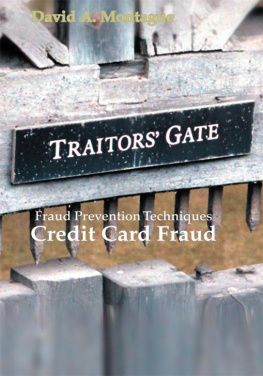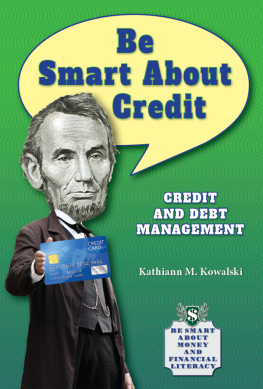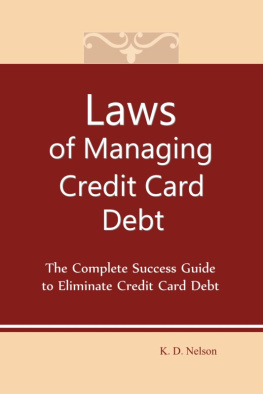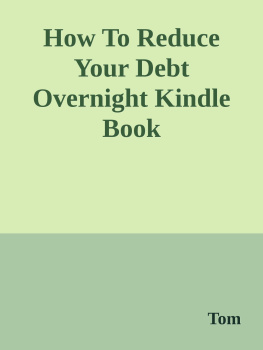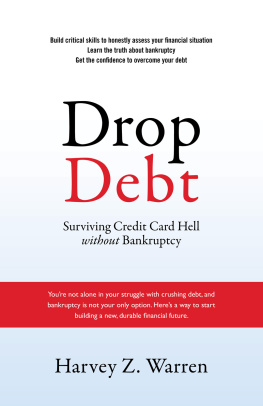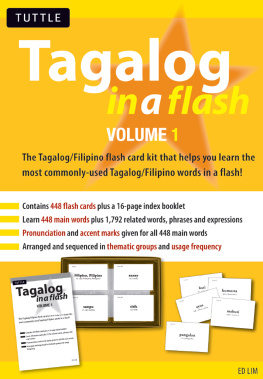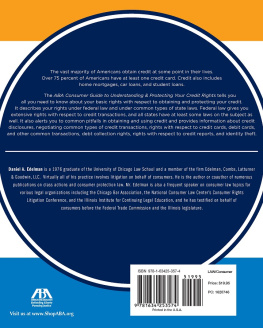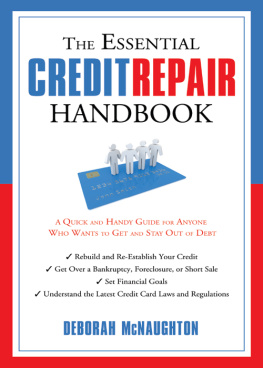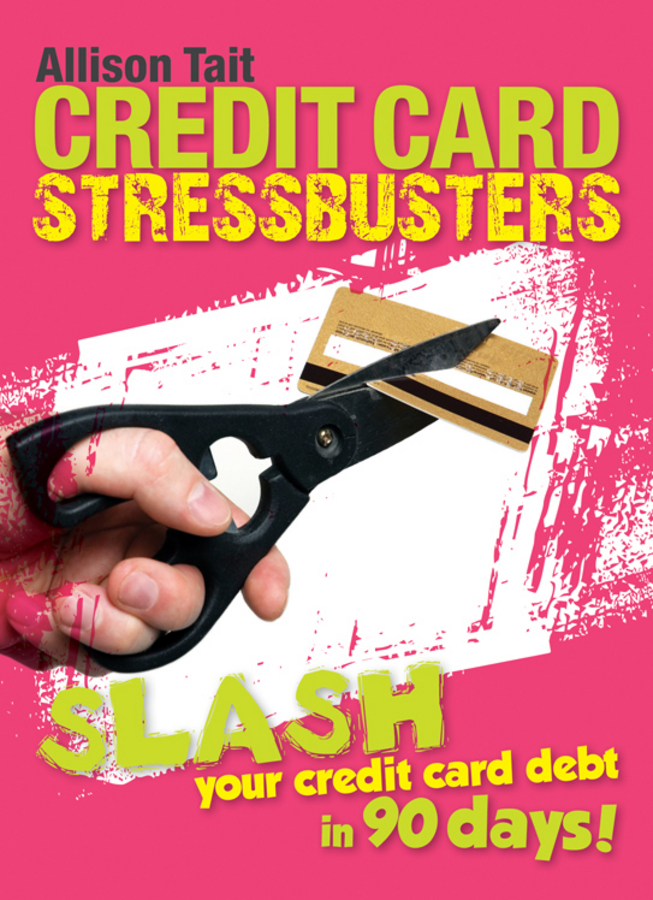Contents

First published 2009 by Wrightbooks
an imprint of John Wiley & Sons Australia, Ltd
42 McDougall Street, Milton Qld 4064
Office also in Melbourne
Typeset in Gill Sans 10.5/13.5pt
Allison Tait 2009
The moral rights of the author have been asserted
National Library of Australia Cataloguing-in-Publication data:
Author: Tait, Allison.
Title: Credit card stressbusters / Allison Tait.
ISBN: 9781742168500 (pbk.)
Notes: Includes index.
Subjects: Credit cards Australia.
Finance, Personal Australia.
Consumer credit Australia Management.
Debt Australia.
Dewey Number: 332.02400994
All rights reserved. Except as permitted under the Australian Copyright Act 1968 (for example, a fair dealing for the purposes of study, research, criticism or review), no part of this book may be reproduced, stored in a retrieval system, communicated or transmitted in any form or by any means without prior written permission. All inquiries should be made to the publisher at the address above.
Cover images iStockphoto/Maciej Korzekwa
Cover design by Popomo
Disclaimer
The material in this publication is of the nature of general comment only, and does not represent professional advice. It is not intended to provide specific guidance for particular circumstances and it should not be relied on as the basis for any decision to take action or not take action on any matter which it covers. Readers should obtain professional advice where appropriate, before making any such decision. To the maximum extent permitted by law, the author and publisher disclaim all responsibility and liability to any person, arising directly or indirectly from any person taking or not taking action based upon the information in this publication.
Acknowledgements
This book would not have been possible without the help of my brains trust. Heartfelt thanks for the sharing of knowledge, good humour and patience must go to Matthew Walker and Laura Menschik from WLM Financial Services, < www.wlm.com.au >; Harry Senlitonga from Cannex, < www.cannex.com.au >; Dr Paul Harrison; Dr Antony Young; Neil Stephens; Susan Stephens; Bartolo Mandile; Meredith Fuller; Jane Nash; Gary Williams at Rosenfeld, Kant & Co, Bondi Junction, NSW; and Lissanne Oliver. A big thank you also to everyone who bared their finances for the case studies in this book. And cheers to Stuart, Diana, Danielle and all the team at ninemsn who got me thinking seriously about the money stuff in the first place.
About the author
Allison Tait is a journalist and writer with more than 20 years experience. During that time, her byline has been seen regularly in magazines, newspapers and websites in Australia and internationally. She has written across a wide variety of subjects, from health, social trends and relationships to interiors, finance and careers. For the past three years Allison has contributed popular fortnightly articles to ninemsns Money website, where she has gained a reputation for writing down-to-earth finance stories that are remarkable for their non-stuffy nature. She revels in finding the most knowledgeable person she can, asking as many boring questions as theyll answer and then presenting the resulting information in the clearest and most accessible way possible. And if it raises a smile now and then, all the better.
Introduction
How do you feel about your credit card? Whether your debt is minimal or mind-blowing, chances are you can answer that question. The thing with credit cards is that they assume an importance in our lives that takes them far beyond an innocuous piece of plastic in our wallet, directly to the heart of the way we live.
For some of us, theyre all about convenience; just another way to conduct financial transactions. These convenience-seekers use credit cards at will, pay them off each month and reap the rewards points. For these people, plastic is fantastic.
For a large proportion of us, however, credit cards are the way we fill the gap between the lifestyle we can afford and the lifestyle we actually live. To these people, a credit card is a frenemy, loved and hated in equal measure. The trouble is that once you get used to the idea of supplementing your income with someone elses cash, it becomes a difficult habit to break. So we love the card for its access to what we think of as life, but hate it because those bills roll around with monotonous regularity, reminding us of our excesses.
Gran would have called it living beyond your means, but in todays society, comfortable with the idea of going into debt to get what we want right now, its just the way we live.
Unfortunately, the way we live sometimes catches up with us, as weve witnessed on a global scale in recent times. No matter how much you owe, if you cant afford to pay it back when the creditor wants it back, youve got a serious problem. Particularly if job security is an issue, or if you have many different debts that all require attention at once.
In times like these, you need to lose the debt. The question is: where do you start? Thats where this book comes in. Call it a crash course in living with your credit card. Its not rocket science. Much like weight loss, the essence of which can be summed up in one sentence (eat less, move more), slashing your credit card debt is about going back to basics and breaking through some boundaries.
There are four main reasons that credit card debt gets out of control: overspending, lack of knowledge, lack of organisation and social pressures.
If youre one of those people (and there are many) who think youre no good with money, or that its too hard, its time to reassess. Financial literacy understanding money stuff is a skill that will make your life easier in ways you never imagined.
And you dont have to be good at it. Getting on top of your credit card debt is about gaining control of your money. Its about knowing what you earn, knowing what you have to spend, and knowing whats left over. Does that sound too hard? With a bit of education, your credit card will assume its rightful role in your life. No longer will it be a nightmare or a disaster area. No longer will it be something you push to the back of your mind and try desperately not to think about.
Depending on the size of your debt, 90 days can be enough time to lose it forever, or enough time to make a serious start. Every persons situation is different, so its important to take the information and advice in this book as a general guide and get some professional help to fill in the blanks as you need them.
Part I
Addicted to credit
Hands up if you put groceries on your credit card this week ... or a few beers with your mates. In the old days (that is, 50 or so years ago), people didnt buy a sofa if they didnt have the cash to pay for it. These days, we think nothing of taking out a loan that is, using our credit card to make up a shortfall in our weekly finances.
Okay, so were comfortable with debt. But did you ever consider the notion that flashing your plastic has become an addiction? Heres how to tell if youre a little too dependent on your credit card (and what to do about it).
Chapter 1
Question: Isnt credit card debt just something we learn to live with?
Answer: Dont get comfortable living beyond your means.
So you owe heaps of cash. Not just credit cards (theyre a given if youre reading this book), but maybe a mortgage, student loans, car loans, that buy-now-pay-later computer and a store card or two. When you make room for so much debt in your life, it all gets a bit ho-hum. You owe heaps. Your friends owe heaps. Why get crazy about it?


